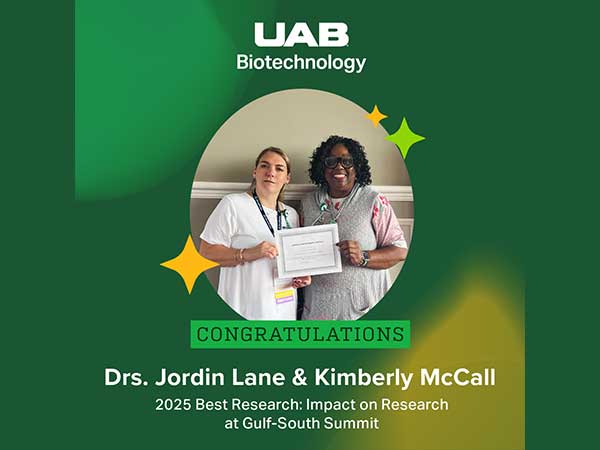As the volume of data in the digital age continues to grow, so does the evolution of the health care industry. From telehealth and health apps to electronic health records and patient surveys, health care generates vast amounts of data daily. Each second, really. So, how do we share data from one health care system to another while ensuring it's correct and accessible to the right person at the right time?  Over 125 applicants applied for the HL7 internship across multiple countries. Gray shares she feels honored to have been selected.This is the question Hope Gray, MTS, BCC, a doctoral student in the Administration-Health Services program – Health Informatics track, will work to answer as the recipient of the competitive Health Level Seven International (HL7) Informatics Internship.
Over 125 applicants applied for the HL7 internship across multiple countries. Gray shares she feels honored to have been selected.This is the question Hope Gray, MTS, BCC, a doctoral student in the Administration-Health Services program – Health Informatics track, will work to answer as the recipient of the competitive Health Level Seven International (HL7) Informatics Internship.
The HL7 is a not-for-profit, ANSI-accredited standards developing organization dedicated to providing a comprehensive framework and related standards for the exchange, integration, sharing, and retrieval of electronic health information that supports clinical practice and health service needs. With more than 1,600 members from over 50 countries, the organization is dedicated to creating a world where everyone can securely access and use the right health data when and where they need it.
The internship will allow Gray to work alongside world-class health informatics experts, learn how consensus-driven standards transform data exchange, and build critical resources for the global health standards community.
“I am so thankful for this opportunity,” said Gray. “Every day, I feel ecstatic to be part of this program and use my skills for a cause I am passionate about.”
"Hope is an inspiration to all around her and time after time has demonstrated hard work and fortitude to advance her field and career," said Ria Hearld, PhD, associate professor and director, PhD in Administration-Health Services program. "She is a great example to doctoral students coming behind her that you can earn prestigious funding while as a student. We are so immensely proud of Hope and I personally cannot wait to see where her journey takes her!"
Since the early age of thirteen, Gray has been fascinated with computer programming. She spent her summers in research programs hosted by the National Society of Black Engineers, learning how to write code and dissect data. She went on to receive her undergraduate degree in computer science before completing her master’s degree in theological studies, combining her passion for science and people. It was a chance encounter with Eta Berner, EdD, university professor and director of the Center for Health Informatics for Patient Safety and Quality, that led her to the doctoral program at UAB. Gray at thirteen practicing computer programming.
Gray at thirteen practicing computer programming.
Gray moved to Birmingham in 2005 from Albuquerque, New Mexico, to complete her master’s degree and pursue chaplaincy — a distinction contingent upon completing clinical pastoral education training in a hospital setting. Eventually, she began working at Children’s of Alabama, where she served as a chaplain and then as an application engineer.
“While working at Children’s one weekend, I was at the UAB Recreation Center and struck up a conversation with Dr. Berner while she was grading papers and relaxing. She shared a bit about the biomedical informatics series she was hosting, and I was immediately interested to learn more,” said Gray. “I eventually went through the program with her, which exposed me to many different areas of informatics. After one of the sessions, I pulled Dr. Berner aside and asked if there was such a thing as health informatics. That’s when she introduced me to Dr. Sue Feldman.”
Gray was one of the first students to follow the HI track in the PhD in Administration-Health Services program. Sue Feldman, RN, MEd, PhD, director of the M.S. in Health Informatics program, has served as Gray’s mentor and advisor during her time at UAB.
“Hope is an example of someone who is not afraid to go after opportunities that will help enrich her classroom experience,” said Feldman. “The knowledge and skills that she will develop during this HL7 internship are applicable to real-world experience. We are proud of Hope and admire her ‘go for it’ attitude.”
Gray plans to blend her clinical informatics knowledge and history as a board-certified chaplain to uncover how maintaining spiritual care information in the electronic health setting impacts patient outcomes – a goal supported by the knowledge she hopes to gain through her 16-week internship.
As for the evolving future of the care sector, she predicts that there will be a growing bridge between patient care and data.
“I believe in the next ten years we will see an even greater increase in patient access to their own electronic health records and greater ability for health care systems to share patient records due to the policies of the US government for health information exchanged,” said Gray. “As a result, patients can proactively engage in their own health information and collaborate with their providers for sustained quality of care.”
To learn more about the Department of Health Services graduate programs, click here.

